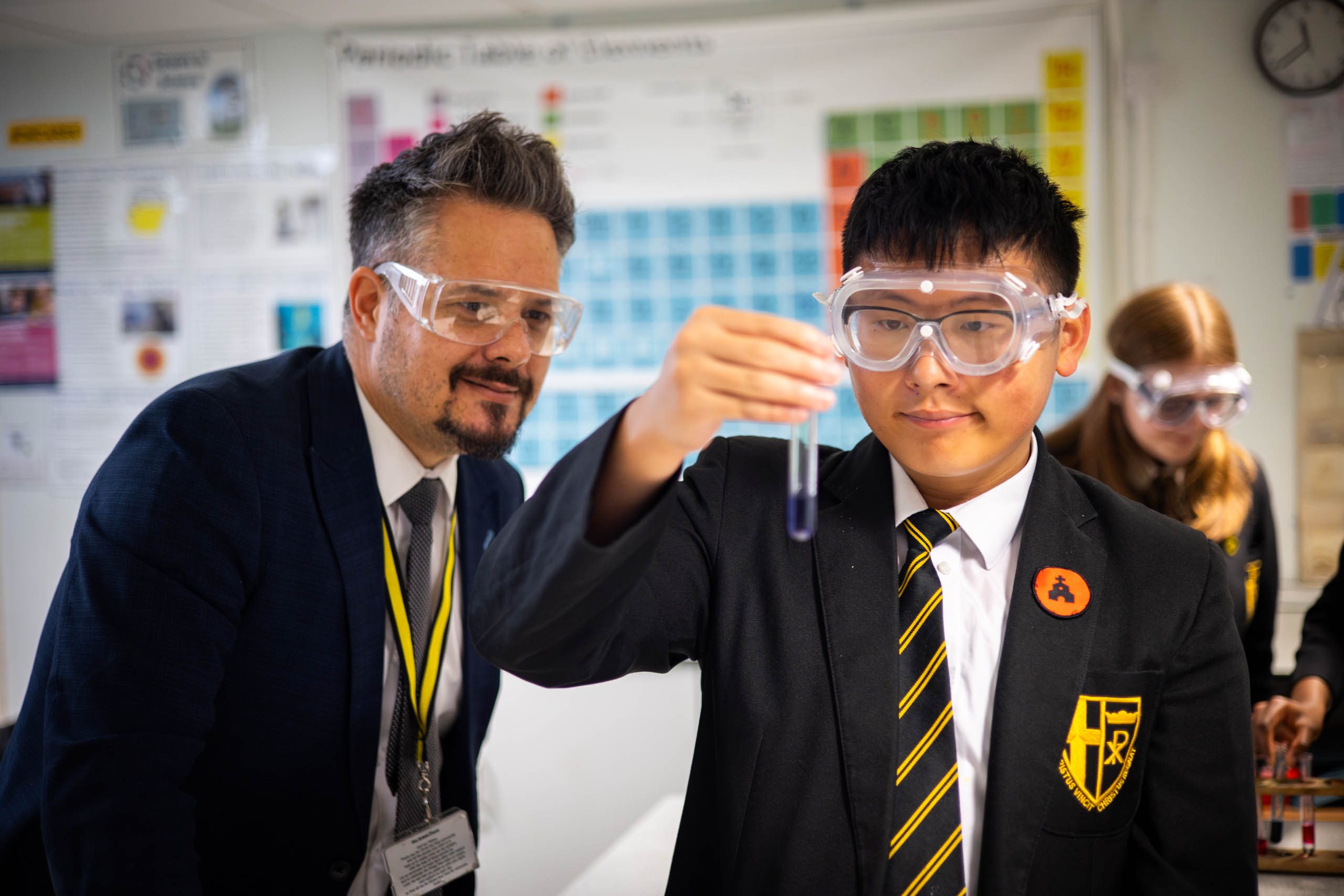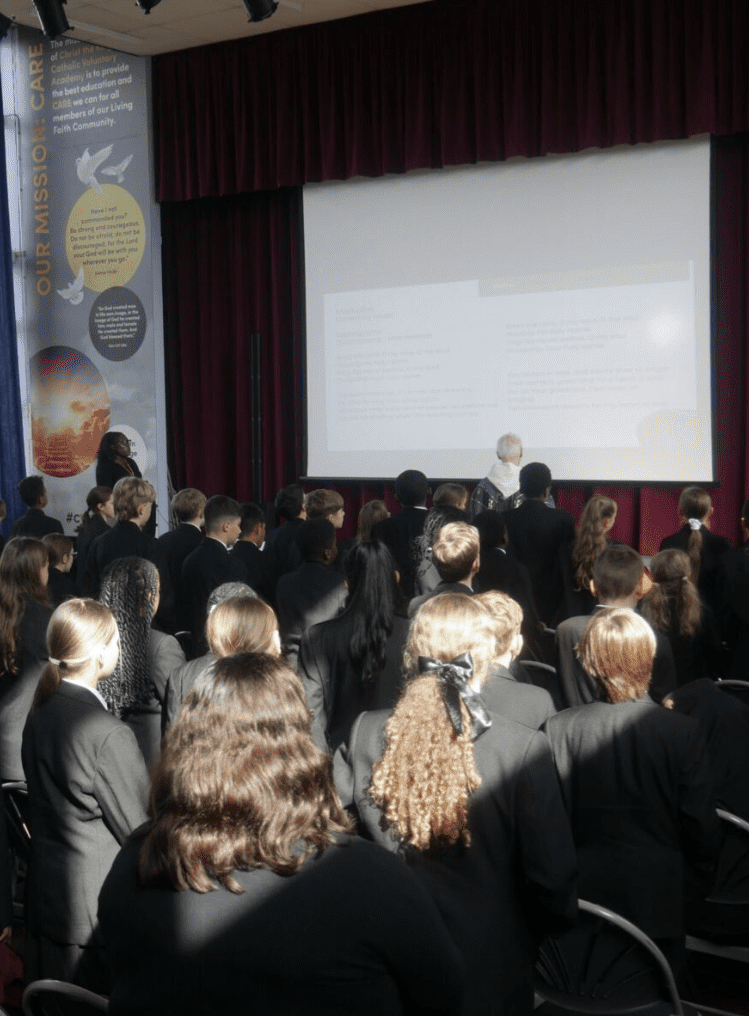Curriculum Intent
In Science, our curriculum intent is:
- To deliver an engaging and challenging curriculum, which enables students to reach their maximum potential by building upon and developing their scientific knowledge, working scientifically and mathematical skills
- To make connections between science and Catholicity, and science within local and wider contexts
Curriculum Plan
GCSE Chemistry Curriculum Plan
A Level Biology Curriculum Plan
A Level Chemistry Curriculum Plan
A Level Physics Curriculum Plan
Student Learning Journey
Student Science Learning Journey
Exam Board Information
Reading List
Key Stage 3
Books:
- Before The World Was Ready: Stories of Daring Genius in Science – Claire Eamer
- Hidden Figures – Margot Lee Shetterly
- The Hitchhikers Guide to the Galaxy – Douglas Adams
- Women in Science: 50 Fearless Pioneers who Changed the World – Rachel Ignotofsky
- Why Does Asparagus Make Your Pee Smell? – Andy Brunning
- The Science Book – DK Books
- Horrible Sciences – Nick Arnold
Websites:
- A list of the best videos and YouTube channels for kids – http://www.whatdowedoallday.com/2014/08/science-youtube-channels.html
- Engaging, thought-provoking, and importantly, fun science – http://www.iflscience.com/
- An exciting science journal for young people – https://catalyst-magazine.org/
- Popular science stories – https://www.popsci.com/
Key Stage 4
Books:
- Day of the Triffids – John Wyndham
- The Periodic Table – Primo Levi
- Why Do Penguins Feet Freeze? – Mick O’Hare
- The Secret Science of Superheroes – Mark Lorch and Andy Miah
- The Mould in Dr Floreys Coat: The Remarkable True Story of the Penicillin Miracle – Eric Lax
Websites:
- An exciting science journal for young people – https://catalyst-magazine.org/
- Captivating developments in science, medicine, technology, and the world around us – https://www.discovermagazine.com/
- BBC Focus magazine – https://www.sciencefocus.com
- New Scientist – https://www.newscientist.com
Key Stage 5 – Biology
Books:
Frank Ryan: Virolution
Lewis Thompson: How We Live and Why We Die, The Secret Lives of Cell
Richard Dawkins: The Selfish Gene
Charles Darwin: The Origin of Species
Adam Rutherford: A Brief History of Everyone Who Ever Lived, The Stories in Our Genes
Matt Ridley: Francis Crick: Discoverer of the Genetic Code
James Watson: DNA, The Secret of Life
Lewis Thomas: The Lives of a Cell: Notes of a Biology Watcher
Armand Marie Leroi: Mutants: On the Form, Varieties and Errors of the Human Body
David S. Goodsell: The Machinery of Life
Ernst Mayr: This Is Biology: The Science of the Living World
George C. Williams: Plan and Purpose in Nature
Edward O Wilson: The Diversity of Life Richard Leaky: The Origin of Humankind
Bill Bryson: A Short History of Nearly Everything
Websites:
An interactive cell biology site – http://www.ibiblio.org/virtualcell/index.htm
A web site showing illustrations of many processes of biotechnology – http://www.accessexcellence.org/RC/VL/GG
Visit the world of electron-microscopy – http://www.uq.oz.au/nanoworld
Explore the genetic code – http://www.dnai.org/a/index.html
Details of the history of the best scientific discoveries – http://nobelprize.org
The site of the scientific journal – http://nature.com
Podcasts, news and interviews with scientists about recent scientific developments – http://royalsociety.org
The London Natural History Museum’s website – http://www.nhm.ac.uk
The website of the British Medical Journal – http://www.bmj.com
Key Stage 5 – Chemistry
Books:
Richard Feynman: The Pleasure of Finding Things Out
Mark Miadownik: Stuff Matters, Exploring the Marvelous Materials that Shape our Man Made World
Hugh Aldersey-Williams: Periodic Tales
John Emsley: Nature’s Building Blocks, An A-Z Guide to the Elements
Sam Kean: The Disappearing Spoon
Oliver Sachs: Uncle Tungsten
John Emsley: The Shocking History of Phosphorus: A Biography of the Devil’s Element
Websites:
Periodic Table of Videos by Martyn Poliakoff – https://www.youtube.com/user/periodicvideos
Royal Society of Chemistry – https://www.rsc.org
Institution of Chemical Engineers – https://www.icheme.org/
Key Stage 5 – Physics
Books:
Stephen Hawking and Leonard Mlodinow: The Grand Design
Stephen Hawking: A Brief History of Time
Brian Cox & Jeff Forshaw: Why Does 𝐸 = 𝑀𝐶2
Brian Cox and Jeff Forshaw: The Quantum Universe: Everything that can happen does happen
Peter Ackroyd: Newton
Helen Czerski: Storm in a Teacup, The Physics of Everyday Life
Simon Singh: Big Bang
Marcus Chown: The Ascent of Gravity
Janna Levin: How the Universe Got It’s Spots
Jon Butterworth: Smashing Physics
Manjit Kumar: Quantum
Websites:
The institute of physics – https://www.iop.org
Curious and quirky videos describing the various symbols used in physics and astronomy – http://www.sixtysymbols.com/
Stay up to date with the latest breakthroughs in physics – https://physicsworld.com/
CERN, home of the world’s largest particle accelerator – https://home.cern/science/accelerators/large-hadron-collider
Career Links
The world of Science is ever evolving, with new jobs and employment opportunities being developed on a yearly basis. Science is a compulsory subject at Key Stage 3 and 4 because of its importance in society and the knowledge that can be gained from studying this in more detail.
Choosing to study Science at A Level opens up a wonderful array of opportunities for you. Not only is it regarded as a reputable A Level subject, it also allows you the opportunity to go on and study the individual sciences in more detail at University Level. For example, many of our students go on to study Biology, Chemistry or Physics at Degree Level.
However, a number of our students move into the world of employment after Year 13, choosing to study an apprenticeship or gaining a job.
Possible careers linked to Science include:
Science Teacher
Pharmacist
Doctor
Science Technician
Laboratory Technician
Chartered Surveyor
Animal Technician
Vet
Astronomer
Crime Scene Investigator
Food Technologist
For further information about the career opportunities that may be available to you, please speak to one of your Science teachers who will be able to discuss this with you.
Subject Leader Information
Subject Leader: Mr Adam Blazewicz-Bell
Email: ablazewiczbell@christtheking.notts.sch.uk







